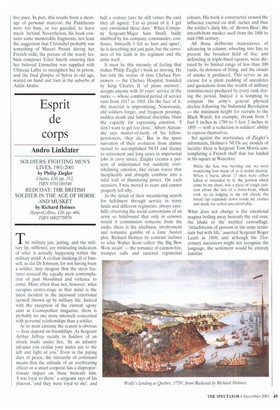Esprit de corps
Andro Linklater
SOLDIERS: FIGHTING MEN'S LIVES, 1901-2001 by Philip Ziegler Chatto, £20, pp. 352, ISBN 0701169540 REDCOAT: THE BRITISH SOLDIER IN THE AGE OF HORSE AND MUSKET by Richard Holmes HarperCollins, £20, pp. 466, ISBN 0002570970 The military jaw, jutting, and the military lip, stiffened, are misleading indicators of what is actually happening within the military mind. A civilian thinking ill of himself, as did Dr Johnson, for not having been a soldier, may imagine that the stern features conceal the equally stern contemplation of past bloodshed and violence to come. More often than not, however, what occupies centre-stage in that mind is the latest incident in the incessant emotional turmoil thrown up by military life. Indeed with the exception of the current agony aunt at Cosmopolitan magazine, there is probably no one more intensely concerned with personal relationships than a soldier.
At its most extreme the reason is obvious — lives depend on friendships. As Sergeant Arthur Jeffrey recalls in Soldiers of an attack made under fire, 'In an infantry advance you realise your mates are to the left and right of you.' Even in the piping days of peace, the hierarchy of command means that the attitude of an overbearing officer or a smart corporal has a disproportionate impact on those beneath him. 'I was loyal to them,' a sergeant says of his platoon, 'and they were loyal to me', and
half a century later he still values the card they all signed: 'I'm so proud of it. I get very emotional these days.' When Company Sergeant-Major Sam Small, badly snubbed by his company commander, confesses, Inwardly I felt so hurt and upset', he is describing not just pain, but the corrosion of his faith in his regiment and the army itself.
It must be this intensity of feeling that makes Philip Ziegler's book so moving. He has told the stories of nine Chelsea Pensioners — the Chelsea Hospital, founded by King Charles II 'of pious memory', accepts anyone with 10 years' service in the ranks — whose combined period of service runs from 1917 to 1965. On the face of it, the material is unpromising. Notoriously, old soldiers forget, and frequent postings, sudden death and habitual discipline blunt the capacity for expressing emotion. 'I don't want to get too close,' Albert Alexandre says matter-of-factly of his fellowpensioners, 'they die.' But in the spare narration of their evolution from clumsy recruit to accomplished NCO and thence to retirement and long years in impersonal jobs in civvy street, Ziegler creates a pattern of understated but suddenly overwhelming emotion, like ocean waves that inexplicably and abruptly combine into a tidal wall of thundering power. On each occasion, I was moved to tears and cannot properly tell why.
In the detail of their meandering search for fulfilment through service in many lands and different regiments, always carefully observing the social conventions of an army so hidebound that only in extremis would it commission someone from the ranks, there is the smallness, involvement and romantic gamble of a Jane Austen plot. Richard Holmes by contrast inclines to what Walter Scott called 'the Big Bow Wow strain' — the romance of cannon-fire, trumpet calls and tattered regimental
colours. His book is constructed around the influence exerted on drill, tactics and thus the soldier's daily life, of 'Brown Bess', the smooth-bore musket used from the 18th to mid-19th century.
All those deliberate manoeuvres, of advancing in column, wheeling into line to present the broadest field of fire, and defending in triple-lined squares, were dictated by its limited range of less than 100 yards, its slowness of firing, and the clouds of smoke it produced. This serves as an excuse for a plum pudding of anecdotes and quotations from the wealth of military reminiscences produced by every rank during the period. Indeed it is tempting to compare the army's general physical decline following the Industrial Revolution — the minimum height for recruits to the Black Watch, for example, shrank from 5 feet 8 inches in 1789 to 5 feet 2 inches in 1895 — with a reduction in soldiers' ability to express themselves.
Set against the inarticulacy of Ziegler's informants, Holmes's NCOs are models of lucidity. Here is Sergeant Tom Morris contemplating a French shell that has landed in his square at Waterloo:
While the fuse was burning out, we were wondering how many of us it would destroy. When it burst, about 17 men were either killed or wounded by it; the portion which came to my share, was a piece of rough castiron about the ize of a horse-bean, which took up its lodging in my left cheek; the blood ran copiously down inside my clothes and made me rather uncomfortable.
What does not change is the emotional magma boiling away beneath the red coat, the khaki or the mottled camouflage. 'Attachments of persons in the army terminate but with life,' asserted Sergeant Roger Lamb in 1809, and although his 21stcentury successors might not recognise the language, the sentiment would be entirely familiar.






















































































 Previous page
Previous page